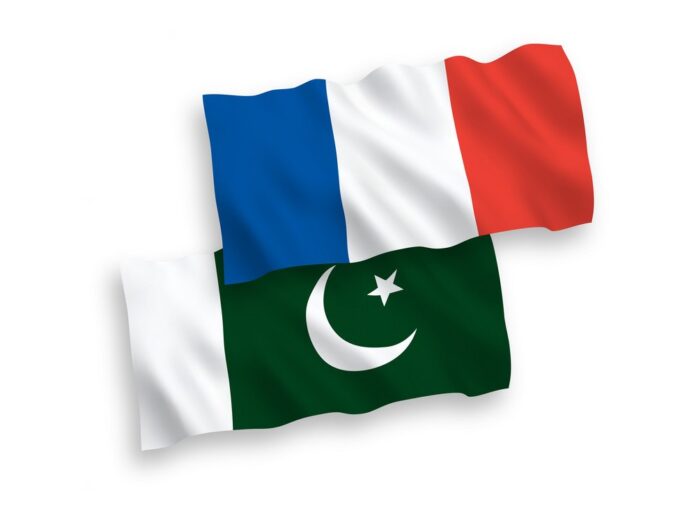The seminar was held on 15th October 2022 on ” France Pakistan Relations” under the auspices of the Quaid-e-Azam House Museum, Institute of Nation Building (INB) with His Excellency Mr. Nicolas GALEY, French Ambassador to Pakistan. The event was moderated by Cdr (R) Sadeed A Malik, Secretary General/ CEO Karachi Council on Foreign Relations (KCFR).
Cdr (R) Sadeed A Malik – Secretary General/CEO, KCFR: Bismillah-Ar-Rahman-Ar-Raheem. His Excellency Mr. Nicolas Galey, French Ambassador to Pakistan; Alexis Chahtahtinsky, the Consul General of France in Karachi; Senior Vice Chairman, Vice Chairman, distinguished members, ladies and gentlemen, Assalam-o-Alaikum, good morning, bonjour. It is a great pleasure for me to welcome you all at the residence of the father of the nation. Today’s program is very brief. Our senior Vice chairman Mr. Liaquat Merchant will welcome his Excellency and after that we will have a short address by His Excellency followed by a brief session of question and answer, lastly there will be concluding remarks by the Vice chairman Mr. Ikram Sehgal. May I now request our Senior Vice chairman Mr. Liaquat Merchant to come and welcome and introduce his Excellency.
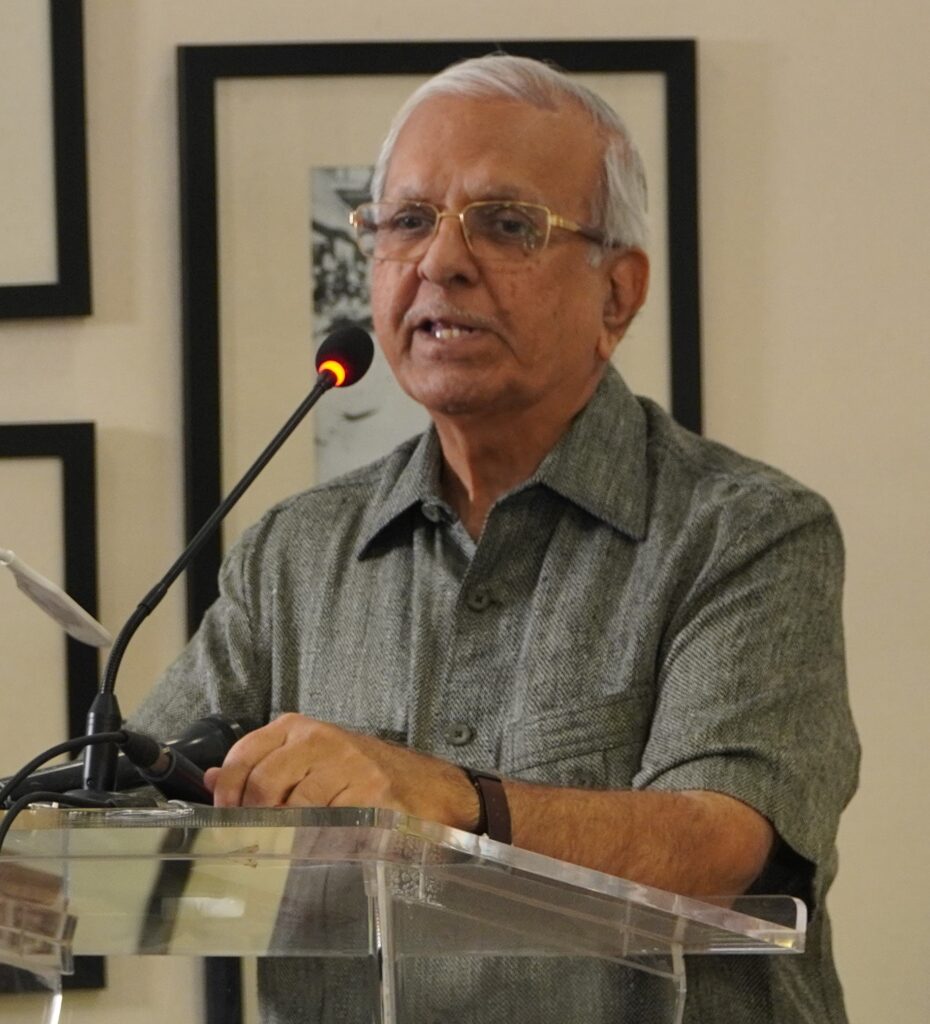
Liaquat Merchant – Sr. Vice Chairman, INB: Ambassador Galey, Mrs. Galey, Consul General for France to Pakistan, Ikram Sehgal Vice Chairman, Rtd Commodore Sadeed Malik, Nadira Panjwani, Vice Chairperson of Karachi Council, distinguished ladies and gentlemen, Assalam-o-alaikum and good morning to you. My address is going to be brief and the purpose is mainly to welcome the new Ambassador to Pakistan, Ambassador Galey and the new Consul General. But I must tell you a few in a few words the background and history of this building which you are visiting today.
This property was purchased by Mr. Jinnah in 1943 intending to be his personal residence. At that time Pakistan had not yet come into being, so he decided that he liked this place, he bought it from a Parsi gentleman and he expressed a desire that this is where he would like to live after Pakistan became a reality. Well, it was not to be, because when he came here he had to live in the Governor General’s house which is not far from here. This property was vacant and ultimately when Mr. Jinnah passed away in 1948, his sister Fatima Jinnah was allowed to live in this property by the government. So, Ms. Fatima Jinnah lived in this property from the time Mr. Jinnah died until 1964, when she moved to Mohatta Palace. Now, very briefly, this house was sold by the administrators of the estate of Mr. Jinnah, that’s myself. I sold this property to the federal government of Pakistan under the orders of the Sindh High Court and certain conditions were laid down on how the property would be used by the government.
They restored the property but the purposes laid down by the High Court were not implemented. Ultimately, under the 18th Amendment this property was transferred to the Sindh government and the Sindh government proved to be more cooperative and very helpful. They entered into an understanding with the Jinnah Society and the Karachi Council on Foreign Relations which was then headed by Mr. Ikram Sehgal as the Chairman. When we signed the MoU under which the property was transferred, the management was given to us, the two sponsors – Jinnah Society and KCFR – and then the Sindh government issued a notification to validate the MoU. We are here in management and control of this property in conjunction with the Sindh government who are the real owners, and we are authorized to carry on multiple activities here but intended mainly to promote the principles, ideas and vision of Mr. Jinnah as a nation-building exercise in Pakistan. That is the reason why we are emphasizing on nation-building and propagating Mr. Jinnah’s principles, ideas and vision. The reason being that 60 percent of our population in Pakistan is under the age of 30, and they have no idea why Pakistan was created, who was behind it and what Pakistan was intended to achieve. This is what we are trying to propagate, educate and instill in the minds of our younger generation, of 60 percent of people in Pakistan, all about Mr. Jinnah – his struggle for Pakistan, what Pakistan was intended to achieve, and whether we did or we did not, and more importantly why the idea of Pakistan will never die.
These are our efforts; this is our principle that we are trying to achieve. With that end in view, we organize programs and we’ll continue doing it. We have a short tenure of four years, maybe it will be renewed by the Sindh government but we have programs here to educate our youth. We have declamations, talks, lectures, including talks by parliamentarians, political leaders, diplomats, ambassadors and film shows. One of our biggest projects is the one which was prepared and formulated and planned by our Vice Chairman Ikram Sehgal and that is to have an underground auditorium behind the property which would house a library, an auditorium and audio-visual center and to add to that we have now decided to install a Digital Archives Center, so it’s a very ambitious program that we are trying to achieve and let’s hope that we are able to do it. We expect funding from the Sindh government which is on its way, it’s been sanctioned and we look forward to making this effort on our part a success.
With these few words, I would now request ambassador Galey to address this audience and give us his views. Mr. Ambassador.
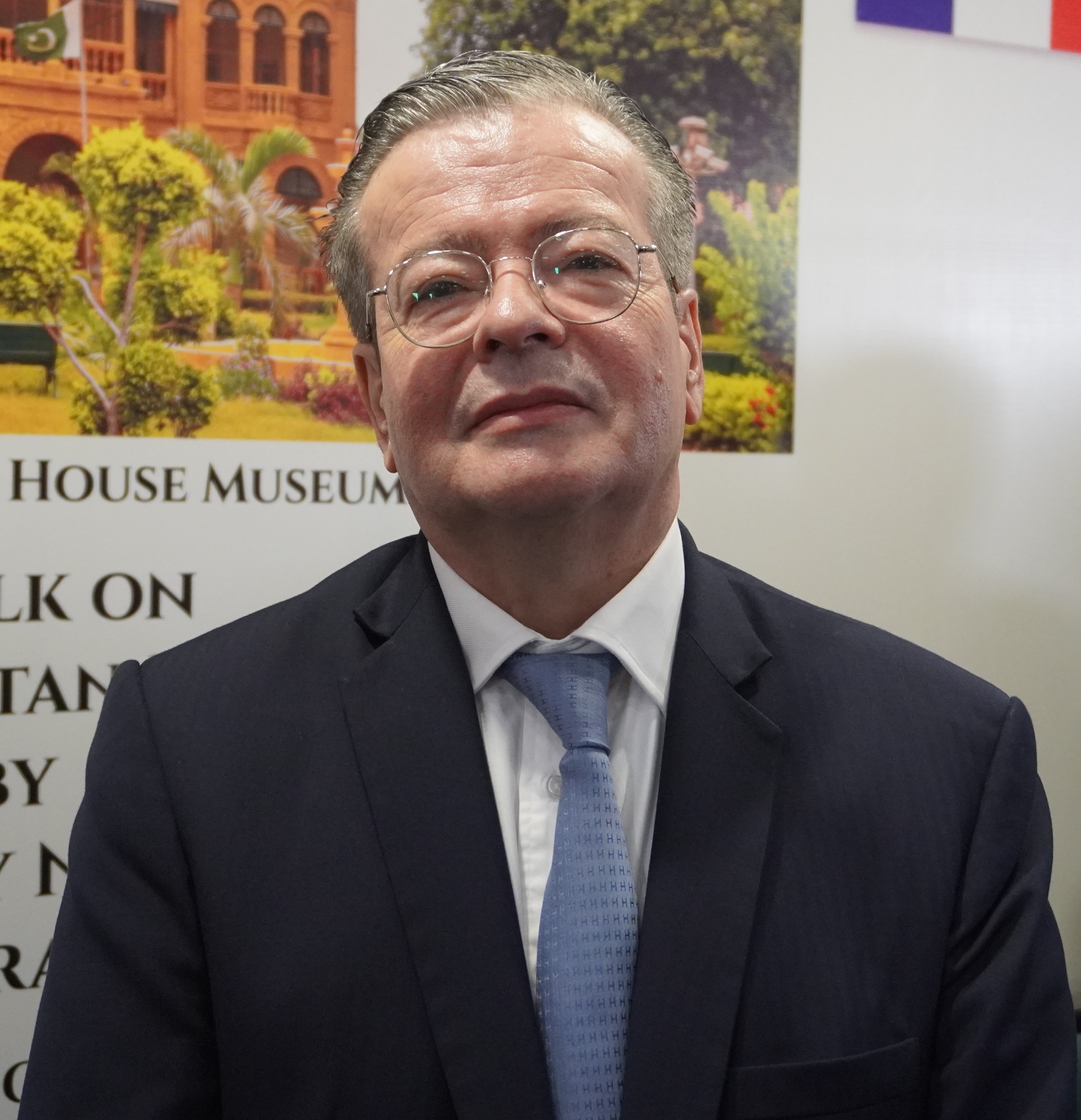
HE Mr. Nicolas GALEY – French Ambassador to Pakistan: Mr. Chairman and Vice Chairman, and members of the Board of this Council and dear friends, I am happy first of all to come here with my wife and the new Consul General Alexei Chahtahtinsky whose name you pronounce with an incredible, incredible facility; it took me a few days to be able to do it. Mine is more simple. We are finishing a very interesting visit in Karachi, my first visit here. I arrived in Pakistan at the end of January 2022, although there were several attempts to travel out of Islamabad, for some reasons it proved not possible, so I was really eager to come here, and we were not at all disappointed. This is a fascinating city, it is such an active, vibrant city with a lot of activities and energy. And also, obviously that’s where we are at this moment, historic monuments. We just visited the mausoleum of Mr. Jinnah this morning, very moving and beautiful monument, and we are now in this house, and I can only support and encourage the project that you just described.
There is a historian who says that those who ignore history are condemned to go through it again. I think it’s very important, as you mentioned, especially in a country with a very young population like Pakistan. The current generations know about the past and how Pakistan was created and who played, of course, the essential role in its history. Actually, something we often recall and remind in our speeches as French diplomats here is that France was the first non-Muslim country to establish diplomatic relations with Pakistan, so that brings us back again to those historic times. It’s a fact that at that time the embassy was here in the Karachi. When I met with the Chief Minister two days ago, I asked him where the French Embassy was in Karachi at that time, and they couldn’t answer immediately, but if anyone has the answer to this question, we would be interested to see the house, if it still exists or at least the location where the embassy was.
So, to talk about the relations between France and Pakistan and going back of course to the very origin of this at the time of the independence of Pakistan, but certainly more importantly, more recent aspects of it, I would like to say first of all that after nine months in Pakistan I really feel a desire from everyone, my interlocutors, to restore good relations after a difficult period, everybody knows what happened at that time and everyone, be it from the government, the Ministries, in all other sectors and cultural sector in particular, but also the economy, we want to turn that page and have good relations between France and Pakistan. Obviously, as an ambassador in Islamabad and my colleague here at the Consulate Karachi, we’re very keen on continuing to restore good relations. It has already started and I think it was demonstrated very recently by the meeting between President Macron and Prime Minister Sharif in New York on 20th of September and the joint statement they made at the end of this meeting about the organization of a conference to help Pakistan cope with these terrible events and especially in Sindh that have affected the country at the end of August.
By the way, it happens as a coincidence that I am in Karachi when there was a second phase of our humanitarian aid that arrived at the airport the day before yesterday. I met the team yesterday at the Marriott hotel, I think now they are on their way to Dadu and they are bringing equipment that purifies dirty water into drinkable water producing 250,000 liters per day. I think it will be – in these difficult circumstances – an important contribution to help the affected populations who are unfortunately in the millions. There was already, at the beginning of the month of September, first team who came with small water pumps, 83, if I remember well, and also medics who were in Badin, so of course the Donors’ Conference would be an expression of solidarity in the mid and long term. But this is an expression of a very concrete solidarity, with people coming from France to help, since we still are somewhat in the emergency phase of the international response and we will obviously also participate in many other appeals from mostly UN but also EU organizations to help Pakistan in in these difficult times.
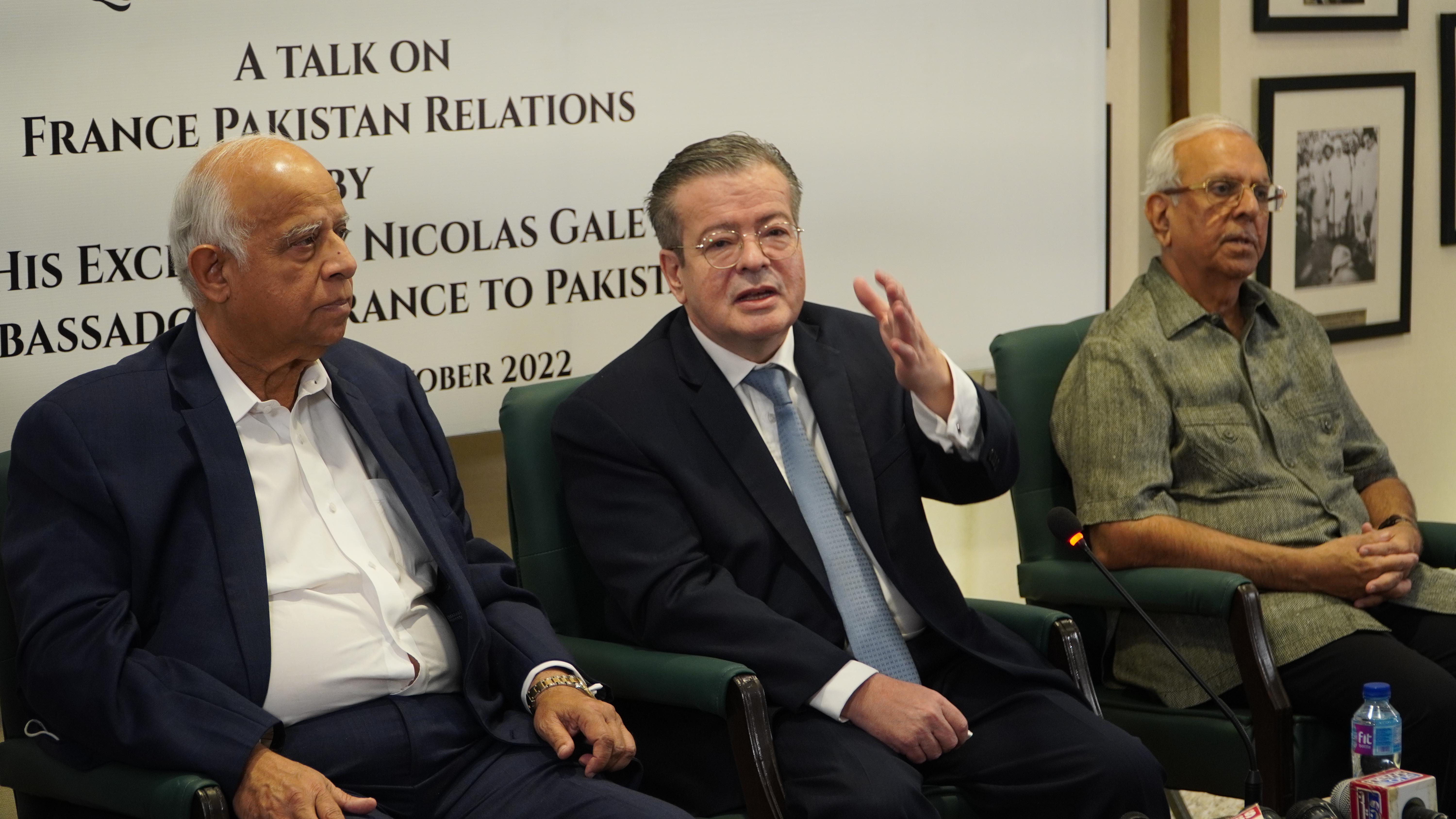
In a way, sad events can also be an opportunity in this effort that both countries want to entertain very good relations to express this will in a very concrete way. After I arrived here, about nine months ago, there were obviously good reasons to try and identify the fields of cooperation and improvement that we could find between France and Pakistan and again, I found a very responsive and positive approach from all my interlocutors, the economy and trade and yesterday here in Karachi I participated in the board of the Pakistan France Business Alliance which is kind of a chamber of commerce. I found all the members very enthusiastic that this association can participate in the restoration of good and active relations between businesses from France and Pakistan. There is in particular the economic sector in which we have a lot to do, and there is agriculture. France is obviously an important country in this regard, production and research, Pakistan is also a big agri-power; fifth or sixth world largest producer of milk and the sector of dairy products is certainly one where we can have a very good cooperation between our two countries.

I also realized that although in the past there were thousands of Pakistani students studying in France, the figures have gone down and have considerably declined, since we have at the moment about 200 students who go to France every year to study, which is three times less than the number of students going to Sweden. Very happy, of course, for the Swedes to receive Pakistanis but when we compare ourselves to Germany, for instance, which is not an English-speaking country, we realize that the Germans welcome more than 4000 students every year whereas we, as I said before, just 200. One effort we have to make on both sides is to make Pakistan better known by French universities and for that reason five University teams from France will come early November and meet with the Pakistani universities so they can see and discuss what kind of curriculum would match their needs. Also from the Pakistani side, we are in close contact with the Higher Education Commission to make studies’ influence better known, and in particular the fact that we now have hundreds of trainings and curricula which are taught in English, which means that the problem of having the full command of the French language should no longer be an obstacle. While we’re speaking of the economy, I think that it would be important – it happened in the past but then COVID came in – so it didn’t produce a lot of results to bring a delegation of our Business Association which is called MEDEF, they made a visit to representatives of all the economic sectors of the French economy, to bring a delegation from this group here in Pakistan so they have a better idea of what is the Pakistani economy today.
There is also obviously political cooperation between governments and we had the opportunity of two high-level visits between foreign ministries, one Pakistani visit to France and one French visit to Pakistan recently to explain our views on a lot of subjects of common interest. We are obviously very interested in getting Pakistani views on the situation in Afghanistan, Pakistanis are interested to know the various approaches in France, in Europe and the rest of the world, of the concept of Indo-Pacific so that is also an important subject we have to exchange between us in order to dissipate misunderstandings and any other international question that represents a challenge for the world. Our position on the Russia-Ukraine conflict is a subject that we discuss, I wouldn’t say daily, but several times per week with the Ministry of Foreign Affairs and other authorities here, so that the French, European and NATO position is well understood, and the draft resolutions we present at the General Assembly of the United Nations get the largest support and we were happy that the last one was very widely supported, not by Pakistan but the global result was very good.
I think that as it was proposed the best way to continue and have an exchange on French Pakistani relations is to have an interaction with all of you so I would be happy to try and respond to your questions but I would like to thank you for taking the time on a Saturday morning to meet with me and my colleague. I’m now at your disposal to answer any question. I just want to stress one last point which is obviously very important for a member of the European Union that our relations with Pakistan are both bilateral and Euro-Pakistani, as you know, the trade regulations between European Union members and third states are regulated from Brussels, and there is a very important negotiation that Pakistan is going through with Brussels regarding this scheme called GSP+, a very important system that allows Pakistan to export to the European Union tariff-free. The first phase of this agreement will end at the end of 2023, there is a new agreement to be discussed and signed to continue the scheme but it’s not just a renewal, it’s another type of agreement and we obviously support very much the efforts of Pakistan to be able to reach this agreement with Brussels and we also support the European Commission in this effort; there were many delegations coming to Islamabad in the last weeks to discuss that. It’s a trade agreement but it also pertains to other subjects related to international conventions to be signed by the parties who have that kind of GSP+ agreement, and that’s why these delegations from Brussels came in the past week. Again, I want to stress the fact that the relations with between Pakistan and any member of the European Union should be seen through the bilateral prism, of course, but also through their relations with Brussels which counts for so much now in our foreign political and trade policy. Thank you very much and now I’m ready, as you like, to answer your questions. Thank you.
Q&A Session
Question: My name is Mubashir Mir, I am the editor of Daily Pakistan here in Karachi. I would like to ask a simple question about islamophobia. We always consider French society as very liberal and a very vibrant society but when we heard about the news regarding Islamophobia, what are the reasons behind this and kindly enlighten us what is the present situation like?
HE Mr. Nicolas GALEY: Thank you, I will answer as much as I can, but when you are referring to news that you receive about Islamophobia in France I believe, what are you referring to in particular because there are many things that we read and for those who live in France or know France doesn’t really match with what we know, so what do you put under the expression?
Question: We saw publications and then news of riots in France, and many other events. It was discussed at the international level as well and also in the United States, the previous Prime Minister of Pakistan pointed out, and then 15th March has been declared as the International Day to Combat Islamophobia.When there are objectionable things being published about the Prophet PBUH, the whole Muslim ummah will stand against these things.
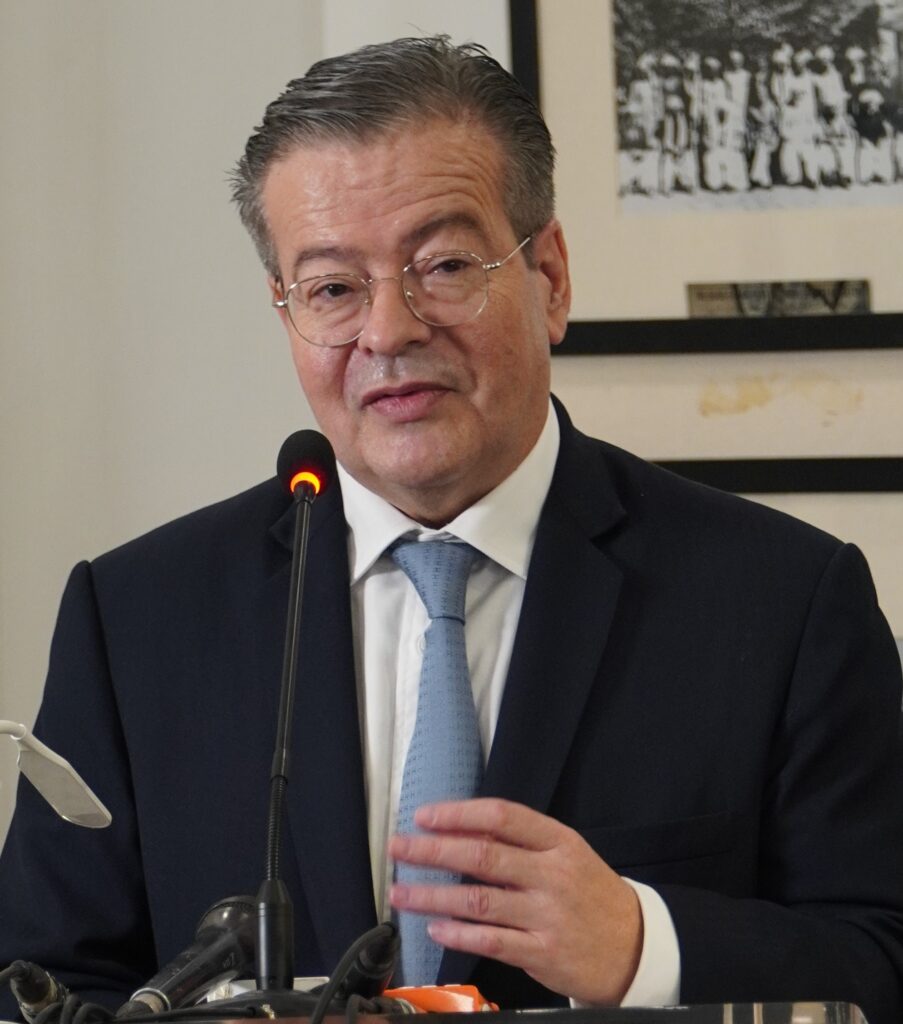
HE Mr. Nicolas GALEY: Thank you for enlightening me because you want me to enlighten you, your answer explains what you hear about so-called islamophobia but it doesn’t give me the kind of event which would demonstrate that. There is – in all countries in the world I’m afraid, unfortunately discrimination and racism that happens everywhere – and certainly we have very strict laws to combat this, we have between five and six million Muslims in France including my own wife, and the notion – which is spread by many media, I’m sorry, in Pakistan and in other countries that – for instance, I sometimes read on Twitter that it is forbidden in France for women to wear a veil which is totally untrue, but that makes people think that this phenomenon exists, then we may have different notions of what freedom of expression may mean and of course we have to discuss about that, and when you are referring to the resolution at the General Assembly of the UN, we have absolutely no problem with any text that says that any manifestation of discrimination, of hostility to Islam should be combated that and is to be fought, that’s absolutely obvious. But what I am a bit puzzled sometimes with this question – which is very frequent – is that the expression is used as if it was a given fact, and when we ask but please tell us exactly when, where and what happened, I give you a counter example; after we had terrible terrorist attacks in Paris and in Nice in the south of France in 2015-2016, there was a real fear, of course, from everyone that there could be some revenge against the Muslim Community we have, although we don’t like the expression ‘community’ in the Republican view of citizenship, but I use it, and I think that it was very reassuring and, I would say, we were quite proud that nothing like that has happened.
We had these terrible attacks in the Bataclan theatre and in the Stade de France stadium and then later in Nice where this man took a truck and killed 86 people, there could have been some retaliation which never happened, I think showed that there is no intention to associate those who use terrorism as the weapon and the rest of the those who believe in a religion who are perfectly assimilated in the French nation so that’s also an aspect. Of course, we say that we talk only about the trains who arrive late and not those who arrive on time. The good thing, I think, in France and in Europe in general is the very good integration of diverse religions who are not originally from Europe and Islam, of course, is the most important of all of them, it is the second religion in France, and again, this presentation of islamophobia as a given fact needs to be substantiated and I’m happy that it is not very substantiated. Thank you.
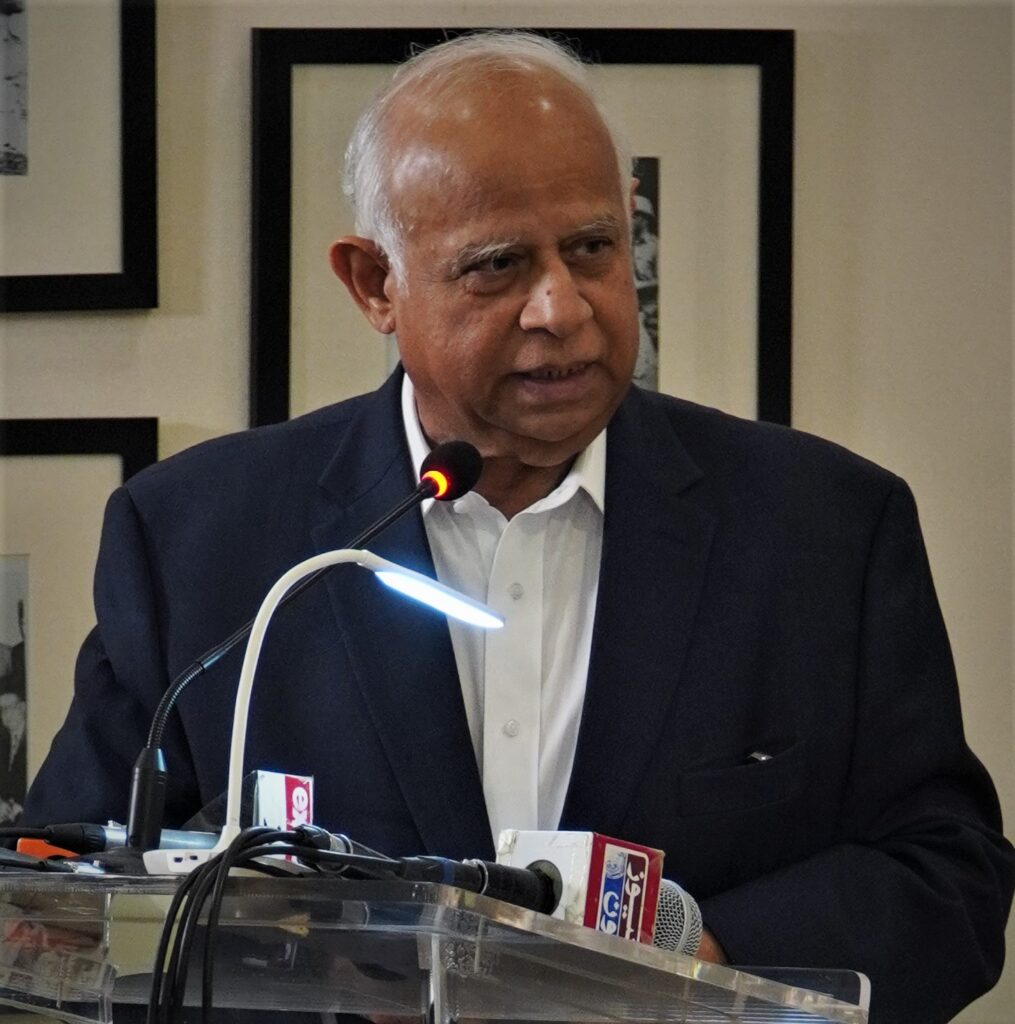
Question: Excellency. I am a former civil servant, my question is, in your opinion what are the chances of a nuclear showdown in Ukraine and if that happens it is very worrisome, what do you think will be the consequences. Why has the West poked the grizzly bear in his eyes? Thank you.
HE Mr. Nicolas GALEY: Well, we do not speak extensively on this subject which is obviously not in my competence here as Ambassador in Pakistan but certainly to give you the position regarding the chances, I’m not sure it would be a chance by the way, but of a nuclear conflict many things have been said by world leaders on the fact that it would be obviously a catastrophic development. The chances, I’m not again in a position to comment on that part of the conflict. When you say poking the grizzly bear in its eye, can you develop a little bit what you mean with this nice expression.
Question: Putin wanted that Ukraine should be a buffer State between the west and the east, and why it was not acceptable to the West. The NATO countries had progressively encroached upon the Warsaw Pact countries including Poland, and I think this was the last straw on the back of the camel as far as Russia is concerned. Why did the west disagree to having a buffer state between Russia and the West.
HE Mr. Nicolas GALEY: That’s your view of how things happened. Actually, Ukraine was not an accepted candidate to NATO and there was a very clear position on this. It was a candidate to the EU and apparently even Russian official statement have said that it would not be a problem in their view, although, it will be a very long process because to be a member of the EU, foreign country like Ukraine, of course Ukraine has been accepted as a candidate but then you have a lot of steps to follow. Then as you certainly know the Russian aggression on the Ukrainian territories don’t go back to the 24th of February, it started in 2014, this is a conflict that has called the best of nearly 15,000 people. In eastern Ukraine the last step was the totally illegal annexation of the provinces.
Ukraine is a sovereign state, they have the right to decide with whom they want to be associated with; what the kind of organization, and we believe that any dispute we have – and there were previous events in Georgia in 2008 as you may remember and then also you have a different framework for discussions with the Russians – one of them being the Minsk Group, which Russia was part of, this should be the right place to discuss the differences. We believe that a dispute, when the country is not in a situation of being itself attacked – I don’t think that anyone has ever tried to say that Ukraine attacked Russia – is not settled by a military attack, by military aggression, so for a permanent member of the Security Council like Russia which should be at the forefront of the promotion of the Charter of the United Nations – which clearly states that international disputes should be settled peacefully, it is a clear breach to have started this war. Maybe they believed it would be a relatively short conflict and to the surprise of many, it is not going to be a short conflict. We will see what happens, I hope, you see that the possibility that you mentioned precisely is not a possibility and that it would not go to this extreme, and that reason and international law prevail.
Question: I am Farooq Afzal, member Board of Governors, KCFR. My question is with regard to the business and investment between Pakistan and France. In 2019, there was a delegation, and I also met with them, and in 2021 there was also a webinar which was held in Paris and it was decided, it was offered to the business community of France that we have like 42 special economic zones which were offered to the business community of France to invest in Pakistan. Also, we offered that we can make a special economic zone only for France as well, which was also discussed at that time. There, we have a huge potential, like information technology to help with tourism, food processing and agriculture sector. We want to learn something from France that how we can also do dairy products, because although we are the fifth largest milk producing country but tons and tons of milk is being wasted, so how do you see that. Another thing is that so far we have hardly direct investment, 1.5 billion dollars from France, do you think that you can help us to get the direct investment and some more investment, as I mentioned in the fields, how soon it can be done. Thank you.
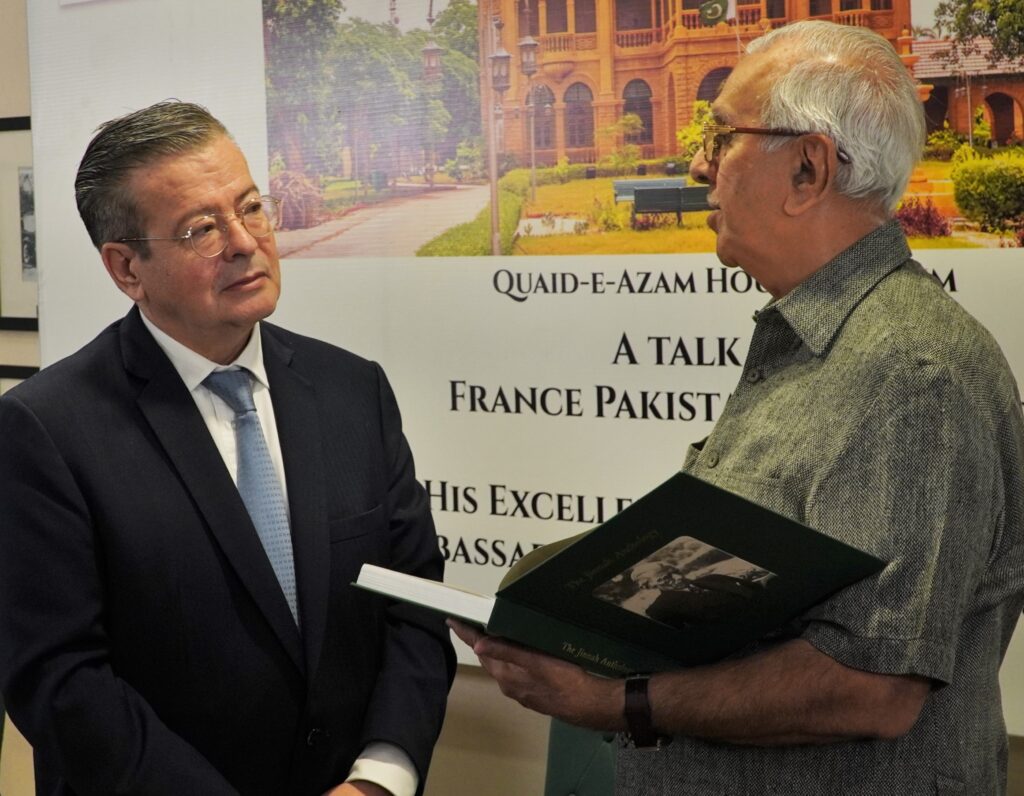
HE Mr. Nicolas GALEY: Well, thank you for saying many things that I myself found very important, more cooperation in the economic field in general and agriculture in particular. I think the first step is to know each other more. The fact is that the stronger relations we had in the 80s and 90s are not the same today, and the contacts and links have to be re-established. You mentioned the MEDEF visit and then we had COVID but as I said my objective is not to have webinars but a real visit, in person, of representatives of MEDEF and also that Pakistani businessmen go to France. There is very little Pakistani investment in France today,that also can be developed and I’m sure that in this particular sector of dairy products we have a lot to do, and we have big companies that have a very high reputation, and I would like very much to have them come here. You know that France is the country of 360 cheeses, and there is also a lot to do here in in Pakistan to make more from milk than it is done now. So yes, very important aspect for French companies is to know the market better, it’s also important for these companies to certainly know this Ease of Doing Business ranking which makes a world ranking of how easy or uneasy it is for foreign companies to invest and to export.
There are some aspects about legal predictability, fiscal aspects, repatriation of dividends or profits which has to be of course very clear for an investor, and all countries are in competition on this today, that’s why this ease of doing business is a very interesting document. Because a company that wants to invest in that part of the world, for instance, we look at that ranking and see which country is the easiest destination in terms of legal and fiscal regulations. We have to promote, but I think also Pakistani companies and Pakistani Embassy in Paris have to do that. It’s a joint effort because of course it’s for mutual benefit, it’s good for Pakistan to have more exchanges and it’s good for us to export more and we also have this very positive scheme that I mentioned with Pakistan, GSP+, which means that all your products, not only textile, although textiles represent about 80 percent, but all kinds of products can be exported to the EU with zero tariff, and Pakistani companies could take even more advantage than now of this system, which is very advantageous.
Question: A lesson that one may have learned in Libya which can be applied to the sub-continent, and when I say subcontinent, I’m talking about Iran, about Pakistan and the rest of the subcontinent itself, that what is the lesson that one can possibly learn from Libyan experience. Also, what is the value of Minsk Agreement which we understand because the question was asked about Russia. It was an understanding that when the Wall came down that none of the Warsaw Pact states will be allowed to join NATO and no troops will be deployed. What is the value of written agreement vs understanding. How should one see it?
HE Mr. Nicolas GALEY: Sorry, again, I’m not here in competence of discussing this story. I’m not going to go back into the origin of the conflict there is just the fact that Russia has attacked its neighbor and that by itself is unacceptable and that’s why we are helping the Ukrainians with many other countries. Your first question, I don’t really see what you may mean through the lessons of Libya in the subcontinent, can you elaborate a little bit?

Question: You’ll find Libya to be a better place today than it was in the past when Gaddafi was there. In reference to the subcontinent, if Iran was to be destabilized, Afghanistan or Pakistan and other states like that, would it be a good thing to happen or would it be a bad thing to happen?
HE Mr. Nicolas GALEY: I will give you a very usual answer from a diplomat, I don’t answer hypothetical questions.
Question: My question is about the proposed international conference to help flood victims, when and where will it happen and will France host it?
HE Mr. Nicolas GALEY: Following the meeting of the French President and the Pakistani Prime Minister and their statement on the 20th of September, now the two governments are discussing how to organize this conference taking into account that it is completely related with the floods in Pakistan. A very busy calendar of events in the coming weeks and months; you have the G20 Conference, the Sharm el-Sheikh – COP 27 Conference. A few days before, you have also the meeting with IMF and the World Bank, also there are many occasions where they can start to discuss that, but it’s really up to the two governments to discuss that with other partners. The UN and the World Bank would be an important one because the World Bank is leading the general assessment that is being made about the catastrophic floods in Pakistan, this is really a process in the making. So, with a very precise question when and where I cannot answer because I don’t think this is already decided on what we have to do.
Question: Thank you, I am the editor of a diplomatic relations magazine. We talk about economy and politics, it is a pleasure to listen to you about geopolitical aspects and economy. You talked about trade and economy, also about agriculture and the dairy products. We organized an event of Mango Festival for diplomats, and the Vice Consul General of France was also there. Since we are into trade and business, we asked him about the Trade Attaché of France in August, he’s based in Islamabad. Karachi is the base of trade industry, and we will be more than happy to welcome the Trade Attaché in Karachi.
HE Mr. Nicolas GALEY: First of all, I participated in the Mango Festival in Islamabad which was honored by the presence of Mr. Bilawal Bhutto Zardari. It was a fantastic tasting different kinds of mangoes. Karachi has a much more important place in economic terms, but we also have mangoes in Islamabad. Secondly, it would be very good if we also had a permanent presence of an economic section posted here. That’s an idea which has been supported by many Consul Generals and because of the importance of Karachi in terms of economy and import export, there are obvious reasons for having someone like that.We are all constrained by budgetary and staff realities. I would hope that this is possible in the future but it is still being studied, so it’s not yet decided. But what certainly will happen is that the team in Islamabad which is not a very big team, there are two of them at the economic section – the economic counselor will be here in Karachi and that he will come more often here in Karachi to keep contact and to develop more links. So that’s something we can decide now, thank you.
Cdr (R) Sadeed A Malik: Thank you Excellency and may I now request our Vice Chairman of Board of Management, Institute of Nation-Building, Quaid-e-Azam House Museum, Mr. Ikram Sehgal for his concluding remarks and vote of thanks.
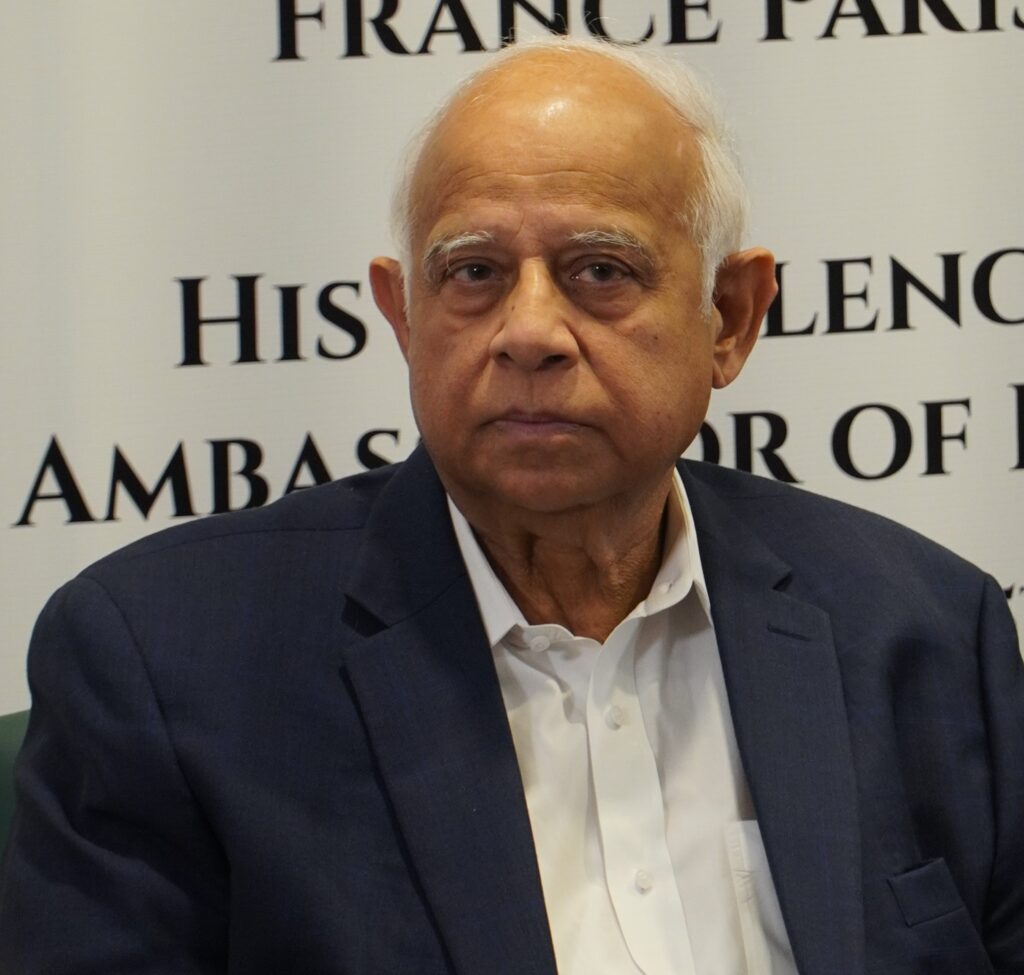
Ikram Sehgal, Vice Chairman, INB: Excellency Nicolas Galey and Consul General, ladies and gentlemen, first of all, thank you for taking the time to come here and for you to be here at the residence of the Quaid-e-Azam – for us, it’s a great honor.
I just want to briefly touch upon some of the subjects, first of all I think one of the major mistakes that Pakistan made, both in its foreign policy but more importantly in its economic policy is that they never take took sight of the fact that in many areas of Africa and other areas, even in French Indo-China, Vietnam etc, the French influence -we never really exploited that French influence. We could have had a lot of collaboration with companies in France to go into Africa, do our own projects, and things like that. We tried East Africa, because of our relationship in the Commonwealth, we had closer relations with them, but we never did that with Africa. I think we have a realization and that is happening now as we speak on the ground.
The other thing which I want to briefly touch upon as KCFR, is that we are organizing a Eurasian conference in Davos this time, which is basically something between KCFR and Le Havre University and the reason is very simple; we think Le Havre is the gateway of Europe from one side and we think Karachi is a gateway of Asia on the other side. Because of our relationship with India, if you look at the current situation, the roads that are going from east to west, on the BRI they actually will pass through Pakistan. They don’t have to come down to CPEC, it will be partly used but they’ll go down to the RCD highway to Istanbul and on to Europe. So, it makes it a very important issue that we have this Eurasian Conference in which we have a lot of people who attended a conference on Eurasia, in which I participated about two months ago in Le Havre University and there was a lot of interest in that to build up the two anchors, Le Havre on one side. Interestingly enough, I think the Secretary General also got an MoU from Le Havre University, he has yet to sign it. In fact, Dr. Huma Baqai is not here but she’s a Rector of MITE University and they also have a MoU which is being signed, they’re going to have a ceremony very shortly.
We talked about investment, I think the Sindh Investment Board Division is very much into it, a lot of French investment can come into Pakistan, particularly into Sindh, and the first step has been made by the great humanitarian assistance that you’re giving to Sindh. This is something that is a great help to the people of Sindh, and it is understood and recognized here in Sindh that it was critical assistance, all the pumps that were given, the doctors that came, etc. I did not know about the aid that came yesterday, but that also helps because particularly in those areas as we need clean water to be available for drinking purposes.
Last point, I want to talk about extremism, hate and extremism, the type of incident that took place it would have spread very rapidly if it had not been for the maturity of the French population that confined it only to that particular area and it finished. If that sort of incident, let us say, I don’t want to give an example, if it happened in Pakistan, then you would have from Karachi to Khyber – it was a bad incident, it was confined and contained because the maturity of the French population, it has a large Muslim population, people don’t realize it, it’s the second largest in fact Muslim population in France, and the maturity of the population, the integration of the society was so much; if such an incident you had in any other country like Pakistan or India, reciprocally, it would have spread very rapidly.
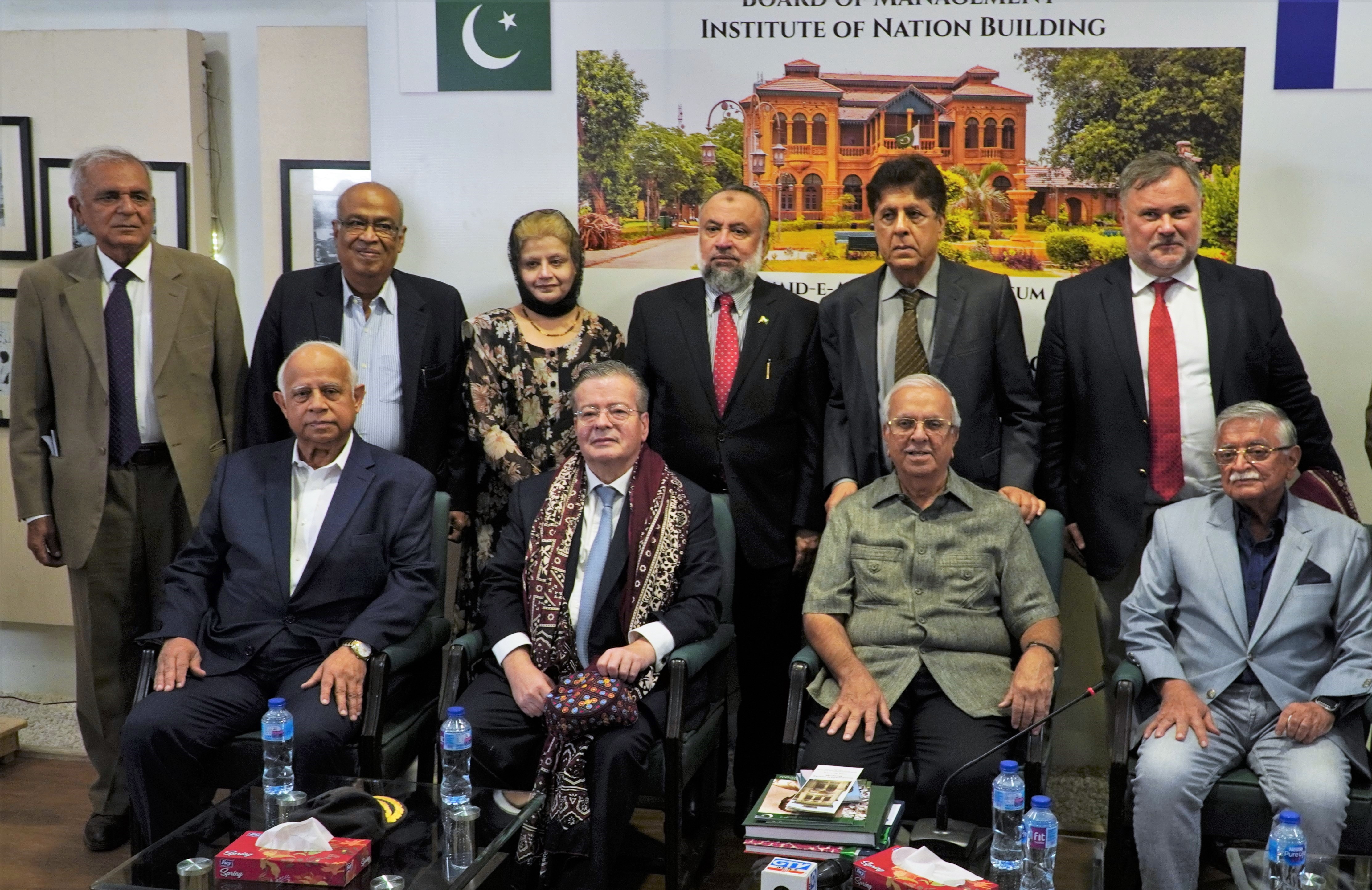
The Vice Chairman mentioned about our project here, I got the idea of this project from the Louvre Museum. Excellency, when you came in you found that there’s no parking here, if there’s no parking to start with how do people visit this place? Number one. Number two, the requirement was to have something to promote the vision of the Quaid and to promote his image. There’s no audio/video center, no auditorium. So, Mr. Liaquat Merchant, we sat down and came together with this idea and we said OK, we’ll do that. So we are now in process, there is a lot of land behind the building, to go underground we plan not only to have an auditorium, an audio/visual center, but also to have a car park, so that this place can accommodate – without affecting the building itself because you do not want to visually affect the building from outside – we would require your help there. If you can have some expertise at least of how the construction took place, how the museum was designed. We have one of the top architects of Pakistan doing this pro bono, Mr. Bilgrami who has actually designed something, but maybe we can take some help, like you have been helping out in other areas, in culture and heritage, etc.
So, with that, I will end with saying something personal, it is a really great honor and privilege to have you, Excellency, here. We do host a lot of people here but we’ve never had this sort of closeness that we’d like, we’d like to use this platform with the new Consul General to promote that friendship, to make sure that we build on that friendship on a broader scale.
So, thank you Excellency, thank you Consul General for being here. Thank you.


